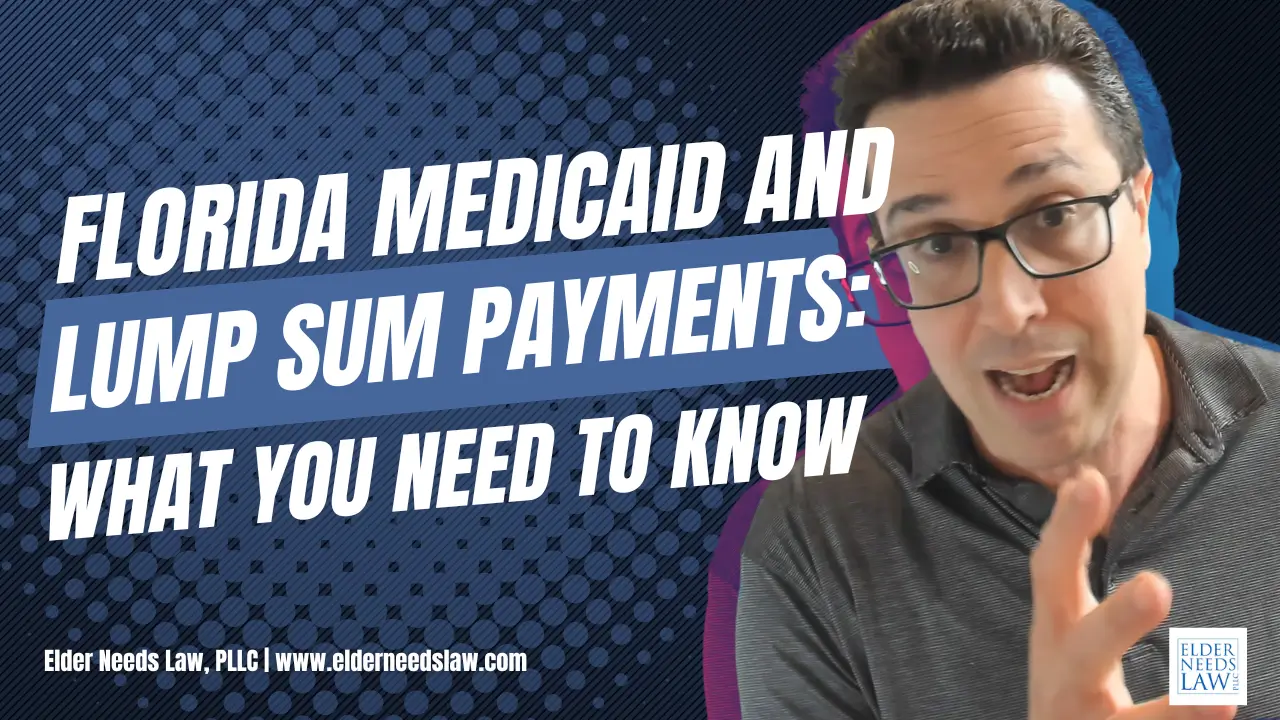Income Trusts - What Do They Say Anyway?

“Irrevocable Income Trusts”, “Qualified Income Trusts”, “Miller Trusts”, “d4B Trusts” – all of these terms can be used interchangeably. They refer to a type of special needs
trust that can be created to circumvent Florida Medicaid’s income limitation rule (also referred to as the Medicaid Income Test). As of January 2024, a Florida Medicaid applicant can earn no more than $2,829.00 per month (gross, i.e. prior to deducting for health insurance, Medicare or any other expenses) from all sources (e.g. social security, pensions, 401(k), IRAs, investment income, etc…).
This is commonly referred to as the "income cap." [Important Note: the Medicaid Income Cap changes every year]
If someone wants to qualify for Medicaid, and they earn more than the income cap, Florida has a legal workaround: the Qualified Income Trust (commonly referred to as an "income trust" or "Miller Trust"). Details on how these work can be found by clicking on the links below.
So you would then go to an elder law attorney or Medicaid attorney to discuss drafting a qualified income trust. Your Medicaid planning lawyer would then gather some basic information and produce a qualified income trust document. Mine runs about 15 pages. Other elder law attorney’s may have Miller Trust documents that run a bit longer or shorter. While you know the goal the income trust accomplishes, you may be wondering why the Miller Trust document has to be so long? Or what is all the legal mumbo-jumbo actually saying?
The purpose of this article is to break down the Miller Trust for you in plain English. Again, other elder law attorney miller trusts will have variations, but the general concepts will likely be virtually identical.
The Qualified Income Trust in Plain English
Typically the trust starts with “whereas” clauses. This just states the intent of the qualified income trust. In this case it is only for the purpose of holding income (no assets). Next, you will likely find key names and definitions:
The title of the trust is important because this is what the bank will look at when opening an account in the name of the Miller Trust.
Miller Trust Key Players
It will also note the Settlor (sometimes referred to as the Grantor) of the Trust. The settlor / grantor just means the person who is creating the trust. If you are looking to qualify for Medicaid, you will likely be the “settlor” (although DCF also authorizes the Medicaid applicant's spouse to establish the qualified income trust as well).
The Miller Trust will list the primary beneficiary – i.e. the Medicaid applicant. This will likely be identical to the settlor / grantor, but need not be. For example, if the beneficiary has a guardian, the guardian might be the settlor who is establishing the trust for the benefit of the person seeking Medicaid eligibility (who will be the named beneficiary).
Also on the first page, you will likely find the name(s) of the initial Trustees or co-trustees (if more than one). The trustees are the person or people (you can have more than one trustee) in charge of the trust. The trustee cannot also be the beneficiary.
Another key party is the Florida Department of Children and Families as they must be listed as primary beneficiary upon the death of the Medicaid recipient.
The Qualified Income Trust Must Be Irrevocable
Another essential component of a qualified income trust is that it be irrevocable. The qualified income trust can only be used for a very limited purpose in order to be valid in the eyes of Medicaid / Department of Children and Families. The Miller Trust document limits the trustee on what they can and cannot deposit into the trust and what they can and cannot withdraw from the Miller Trust.
If the Medicaid applicant is not receiving Medicaid benefits or stops receiving Medicaid benefits, then the trustee is given broader discretion on how to utilize the funds in the account.
How Can QIT Funds Be Spent?
Any kind of trust is basically an instruction manual for the trustee. It explains what the trustee can and cannot do. A qualified income trust is no different. It will explain how the trustee is to spend the money held within the trust for the benefit of the beneficiary. In the case of a Miller Trust, the trustee must spend the money on the health or medical expenses of the beneficiary.
In a nursing home context, this will mean that all of the income in the qualified income trust goes to the nursing facility (less the $130.00 personal needs allowance and a very limited number of other expenditures such as Medicare Supplement premiums).
In an assisted living facility context or for those receiving care at home, the QIT funds must be spend on health care or medical expenses incurred by the QIT beneficiary (e.g. extra home health aide expenses or the part of the ALF bill that Medicaid does not cover).
The Qualified Income Trust Explains What Happens After The Medicaid Recipient Passes Away
The Qualified Income Trust trustee has to abide by some very strict rules on what is to be done with the money in the qualified income trust account after the Medicaid recipient passes away.
First and foremost, the Florida Department of Children and Families (the agency that administers Medicaid in Florida) and any other State in which the Medicaid recipient received Medicaid benefits, must be notified. DCF (and other states) will then submit their claims for reimbursement up to the amount of benefits they paid. Only after DCF has been paid back in full can the remaining amounts of money in the Miller Trust be distributed to other beneficiaries (typically family members).
In the abundance of caution, the Miller Trust will name these secondary beneficiaries. But realistically, there is a very small likelihood of anyone but the State receiving anything. The reason for this is that the Qualified Income Trust tends not to accumulate any money. Other than a small personal-needs allowance ($130.00 as of the writing of this article) and very few enumerated other expenses (e.g. health insurance premiums), the Medicaid recipient’s income is mostly coming into the account and immediately flowing out of the account to the skilled nursing home as part of the patient’s responsibility amount.
What Happens if Miller Trust Trustee Cannot Serve or Resigns?
The trust sets forth the procedure to remove a trustee if their capacity is called into question and also anticipates what would happen if the trustee can otherwise no longer serve. There may be a named successor trustee – sort of a trustee on deck that has no power now but would be willing and able to step into the shoes of the initial trustee. The trust can also provide a procedure for the settlor to name a new trustee should the initial trustee and successor trustee(s) be unavailable to serve.
There are certainly other provisions but the above are the major points covered. For further clarification, speak to your elder law attorney or, if you do not have one, feel free to call us (305-614-7379) and set up a consultation with one of our Medicaid lawyers by telephone or in person.
Florida Medicaid Attorney Resources
What is a Medicaid Qualified Income Trust?
What is a Medicaid Special Needs Trust?







